初中英语动词分类讲解及练习有答案
英语中考专项讲解练习:动词1(含答案版)
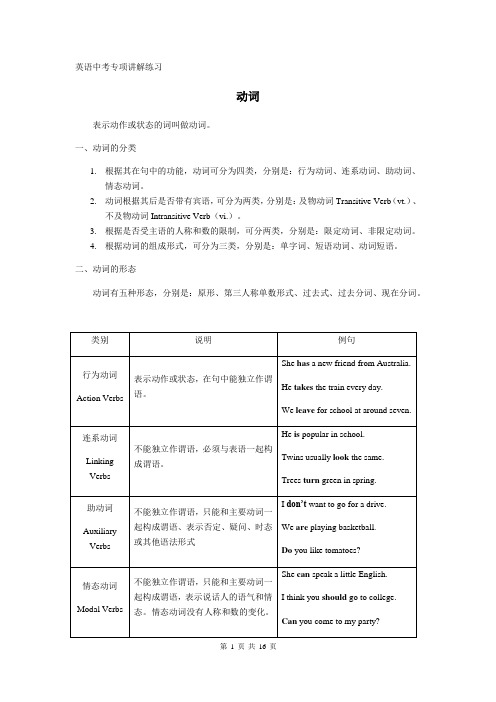
英语中考专项讲解练习动词表示动作或状态的词叫做动词。
一、动词的分类1.根据其在句中的功能,动词可分为四类,分别是:行为动词、连系动词、助动词、情态动词。
2.动词根据其后是否带有宾语,可分为两类,分别是:及物动词Transitive Verb(vt.)、不及物动词Intransitive Verb(vi.)。
3.根据是否受主语的人称和数的限制,可分两类,分别是:限定动词、非限定动词。
4.根据动词的组成形式,可分为三类,分别是:单字词、短语动词、动词短语。
二、动词的形态动词有五种形态,分别是:原形、第三人称单数形式、过去式、过去分词、现在分词。
三、行为动词行为动词又叫实义动词,实义动词意义完全,能独立作谓语。
Mr. Smith gave his wife twenty pounds for her birthday.He asked the teacher a few questions.Children and young people like bright color.He doesn’t like English. (doesn’t是助动词,无词义,like是实义动词)四、系动词系动词又叫联系动词,它本身有词义,但不能单独用作谓语,后面必须跟表语,构成系表结构说明主语的状态、性质、特征等情况。
1.状态系动词用来表示主语状态,只有be一词。
如:He is a teacher (is与补足语一起说明主语的身份)2.持续系动词用来表示主语持续或保持一种状况或态度,主要有keep, rest, remain, stay, lie, stand。
He always keeps silent at meeting.(keep系动词silent表语,系表结构作谓语)This matter rests a mystery.3.表像系动词用来表示"看起来像"这一概念,主要有seem, appear, look。
初中英语动词分类讲解及练习(有答案)
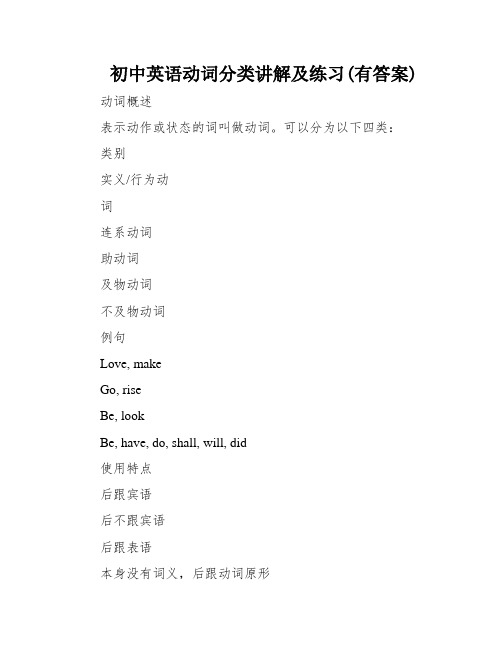
初中英语动词分类讲解及练习(有答案)动词概述表示动作或状态的词叫做动词。
可以分为以下四类:类别实义/行为动词连系动词助动词及物动词不及物动词例句Love, makeGo, riseBe, lookBe, have, do, shall, will, did使用特点后跟宾语后不跟宾语后跟表语本身没有词义,后跟动词原形或分词,构成疑问句或否定句等本身有词义,后跟动词原形,构成谓语情态动词一、实义动词Can, may, mist■①及物动词与不及物动词按照背面是不是带宾语,行动动词又可分为及物动词和不及物动词,及物动词。
Vt. vi .They study hard.I know them well.注:有的动词既可作及物动词,也可用作不及物动词。
如:XXX.She sang an English song just now.英语里有不少实义动词可以兼作及物动词和不及物动词。
兼作及物动词和不及物动词时,____不变。
试比较:Shall I begin at once?She began working as a librarian after she left school.When did they leave Chicago?They left last week.短语:■②动态动词和静态动词动态动词表示动作,如give, take, work, run等;静态动词表示感觉、情感、内心世界、相互关系等,如know, exist, be, have, appear, prove, concern, hate,dislike, like, love, surprise,include, depend on, belong to, guess, suppose,imagine, believe, doubt, admire, XXX等。
■③延续性动词和非延续性动词根据动作是否延续,行为动词又分为延续性动词和非延续性动词。
初中英语动词练习题及解析
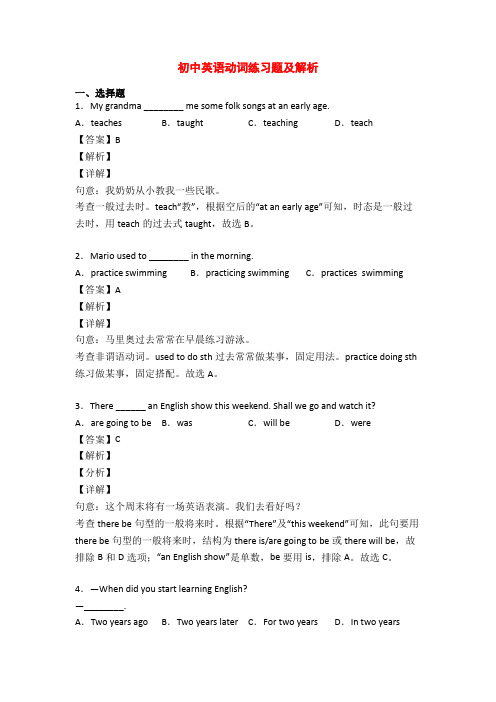
初中英语动词练习题及解析一、选择题1.My grandma ________ me some folk songs at an early age.A.teaches B.taught C.teaching D.teach【答案】B【解析】【详解】句意:我奶奶从小教我一些民歌。
考查一般过去时。
teach“教”,根据空后的“at an early age”可知,时态是一般过去时,用teach的过去式taught,故选B。
2.Mario used to ________ in the morning.A.practice swimming B.practicing swimming C.practices swimming 【答案】A【解析】【详解】句意:马里奥过去常常在早晨练习游泳。
考查非谓语动词。
used to do sth过去常常做某事,固定用法。
practice doing sth 练习做某事,固定搭配。
故选A。
3.There ______ an English show this weekend. Shall we go and watch it?A.are going to be B.was C.will be D.were【答案】C【解析】【分析】【详解】句意:这个周末将有一场英语表演。
我们去看好吗?考查there be句型的一般将来时。
根据“There”及“this weekend”可知,此句要用there be句型的一般将来时,结构为there is/are going to be或there will be,故排除B和D选项;“an English show”是单数,be要用is,排除A。
故选C。
4.—When did you start learning English?—________.A.Two years ago B.Two years later C.For two years D.In two years【解析】【详解】句意:——你什么时候开始学英语的?——两年前。
(英语)初中必备英语动词技巧全解及练习题(含答案)及解析

(英语)初中必备英语动词技巧全解及练习题(含答案)及解析一、动词1.David Beckham decided to playing football match forever because he is not energetic enough.A. put offB. deal withC. break offD. give up【答案】D【解析】【分析】句意:大卫·贝克汉姆决定永远放弃足球比赛,因为他没有足够的精力。
put off意为“推迟”;deal with意为“处理”;break off意为“中断”;give up意为“放弃”。
故答案为D。
【点评】考查动词短语辨析。
2.Mom, what are you cooking now? It so nice.A. smellsB. feelsC. soundsD. tastes【答案】 A【解析】【分析】句意:妈妈,你在煮什么?闻起来这样香。
A.闻起来;B.感觉起来,摸起来;C.听起来;D.尝起来。
从语境上可以分析出,我没有看到妈妈煮的什么,只是闻到了香味,用闻起来,故选A。
3.—What do you think of the dish I cooked for you? —I haven't had it yet. However, it good.A. tastesB. smellsC. soundsD. feels【答案】B【解析】【分析】句意:—你认为我给你做的菜怎么样?—我还没有吃。
然而,它闻起来很好闻。
A.品尝起来;B.闻起来;C.听起来;D.感觉,摸起来。
结合句意,他没有吃,因此应该是闻起来好。
故选B。
4.This kind of cloth _ soft.A. feelsB. tastesC. smells【答案】A【解析】【分析】句意:这种布摸起来是柔软的。
A.感觉,触摸;B.尝起来;C.闻起来。
主语是cloth布,故用动词feel(触摸),选A。
(英语)初中英语动词基本形式常见题型及答题技巧及练习题(含答案)及解析
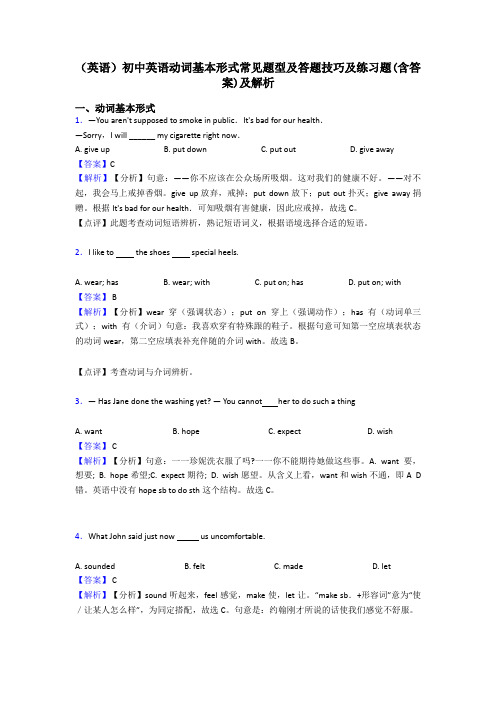
(英语)初中英语动词基本形式常见题型及答题技巧及练习题(含答案)及解析一、动词基本形式1.—You aren't supposed to smoke in public.It's bad for our health.—Sorry,I will ______ my cigarette right now.A. give upB. put downC. put outD. give away【答案】C【解析】【分析】句意:——你不应该在公众场所吸烟。
这对我们的健康不好。
——对不起,我会马上戒掉香烟。
give up放弃,戒掉;put down放下;put out扑灭;give away捐赠。
根据It's bad for our health.可知吸烟有害健康,因此应戒掉,故选C。
【点评】此题考查动词短语辨析,熟记短语词义,根据语境选择合适的短语。
2.I like to the shoes special heels.A. wear; hasB. wear; withC. put on; hasD. put on; with【答案】 B【解析】【分析】wear穿(强调状态);put on穿上(强调动作);has有(动词单三式);with有(介词)句意:我喜欢穿有特殊跟的鞋子。
根据句意可知第一空应填表状态的动词wear,第二空应填表补充伴随的介词with。
故选B。
【点评】考查动词与介词辨析。
3.— Has Jane done the washing yet? — You cannot her to do such a thingA. wantB. hopeC. expectD. wish【答案】 C【解析】【分析】句意:一一珍妮洗衣服了吗?一一你不能期待她做这些事。
A. want要,想要; B. hope希望;C. expect期待; D. wish愿望。
从含义上看,want和wish不通,即A D 错。
初中英语常考动词短语及练习题+答案
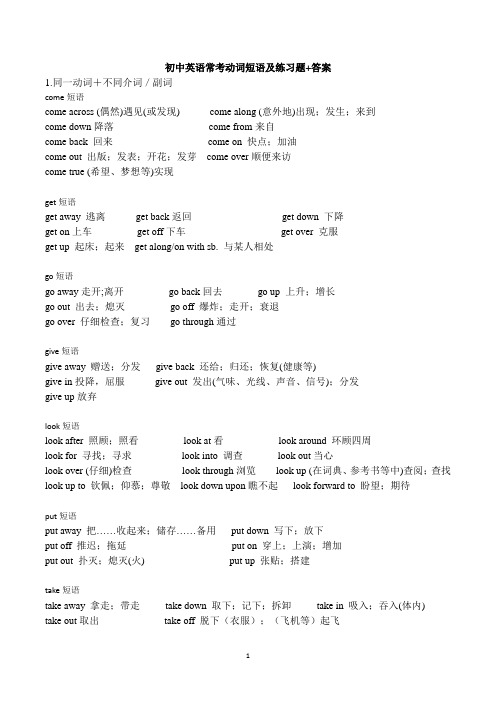
初中英语常考动词短语及练习题+答案1.同一动词+不同介词/副词come短语come across (偶然)遇见(或发现) come along (意外地)出现;发生;来到come down 降落come from 来自come back 回来come on 快点;加油come out 出版;发表;开花;发芽come over 顺便来访come true (希望、梦想等)实现get短语get away 逃离get back 返回get down 下降get on 上车get off 下车get over 克服get up 起床;起来get along/on with sb. 与某人相处go短语go away 走开;离开go back 回去go up 上升;增长go out 出去;熄灭go off 爆炸;走开;衰退go over 仔细检查;复习go through 通过give短语give away 赠送;分发give back 还给;归还;恢复(健康等)give in 投降,屈服give out 发出(气味、光线、声音、信号);分发give up 放弃look短语look after 照顾;照看look at 看look around 环顾四周look for 寻找;寻求look into 调查look out 当心look over (仔细)检查look through 浏览look up (在词典、参考书等中)查阅;查找look up to 钦佩;仰慕;尊敬look down upon 瞧不起look forward to 盼望;期待put短语put away 把……收起来;储存……备用put down 写下;放下put off 推迟;拖延put on 穿上;上演;增加put out 扑灭;熄灭(火) put up 张贴;搭建take短语take away 拿走;带走take down 取下;记下;拆卸take in 吸入;吞入(体内) take out 取出take off 脱下(衣服);(飞机等)起飞take up 占据(时间、空间);开始从事;拿起take care 当心;小心take after (在外貌、性格等方面)与(父母等)相像take care of 照看;照顾turn短语turn down 调低,调小;拒绝turn up 开大, 调高;出现turn on 打开turn off 关闭 turn out 结果是turn in 上交2.不同动词+同一介词/副词about短语care about 关心;在意talk about 谈论;讨论;议论think about 考虑throw about 乱丢;抛撒worry about 担心at短语point at 指向look at 看(某人)throw at 投向;掷向laugh at(sb.) 嘲笑(某人)knock at 敲shout at(sb.) 对(某人)大喊aim at 瞄准;旨在away短语get away 逃离give away 赠送;分发put away 把……收起来;储存……备用run away 逃跑;跑掉take away 拿走throw away 扔掉move away 搬走,移开back短语bring back 恢复;使想起;归还come back 回来get back 回来;恢复give back 归还;送回go back 回去pay back 偿还(借款等)talk back 回嘴;顶嘴down短语break down 停止运转;出故障calm down 保持冷静cut down 砍倒;削减fall down 落下;摔倒get down 下来;落下put down 写下;记下;放下shut down 关上;停业take down 拆除;记录turn down 调低;关小;拒绝write down 写下;记下in短语believe in 信任;信赖check in 报到;登记come in 进来hand in 交上;提交;呈送take in 吸入;吞入(体内);理解;欺骗of短语hear of 听说think of 思考;考虑get out of 离开;从……出来take care of 照顾;照看off短语break off 突然中止;中断cut off 切除;切断drop off 减少;下降fall off 从……掉下get off 脱下;下车go off (闹钟)发出响声;发出(光、热等)keep off 勿踏;勿踩knock off 停止做某事pay off 偿清(欠款等)put off 推迟;拖延run off 跑掉;迅速离开see off(为某人)送行set off 动身(去某地);起程send off 派遣shut off 关闭;停止运转take off 脱下(衣服),(飞机等)起飞tell off 责备;分派turn off 关闭on短语put on 穿上turn on 打开fight on 坚持pass on 传递keep on 继续(进行)try on 试穿;试试看work on 从事;忙于depend on 依赖come on 赶快;加油;来吧hold on 等一等(别挂电话)out短语blow out 吹灭break out (战争、火灾等)突然发生;爆发bring out 使显现;使表现出check out 查明;离开clean out 清除;把……打扫干净clear out 清理;丢掉come out 出版;发表cut out 删除;删去find out 查明;发现;了解get out 出去,离开give out 发出(气味、光线、声音、信号);分发go out 出去;熄灭hand out 分发;发放keep out 不让......进入leave out 不包括;不提及;忽略look out 留神;当心put out 扑灭;熄灭(火) run out 用尽;耗尽sell out 卖完;售光set out 出发;启程stand out 站出来;突出;坚持到底take out 取出work out 算出;解决help (sb.) out 帮助(某人)解决困难over短语come over 顺便来访fall over 绊倒get over 克服;恢复;原谅go over 仔细检查;复习look over (仔细)检查up短语bring up 教育;培养;提出cheer up 使振奋;使高兴起来(cheer sb. up)clean up (把……)打扫干净;(把……)收拾整齐cut up 切碎dress up 穿上盛装;装扮eat up 吃光;吃完fix up 修理;修补get up 起床give up 放弃grow up 成长;长大hang up 挂断电话hurry up 赶快look up (在词典、参考书等中)查阅;查找make up 编造;形成;组成pick up 捡起put up 张贴;搭建send up 发射,把……送上去set up 建立;创立;开办show up 出席;露面stay up 不睡觉;熬夜take up (尤指为消遣)学着做;开始做think up 想出turn up 开大(声音);出现use up 用完;用光;耗尽with短语agree with 赞同;持相同意见begin with 以……开始connect with 与……相连deal with 处理;应付catch up with 赶上come up with 提出;想出(主意、回答等) get along/on with sb. 与某人相处go on with 继续keep in touch with sb. 与某人保持联系keep up with 与......并驾齐驱;跟上巩固练习一、选择题:()1.She will never _______ her dream until it comes true one day.A. give upB. give inC. give outD. give away()2.—Hurry up! I’m afraid we will miss the plane.—Don’t worry! The plane will not _____ until 12 o’clock.A. take afterB. take awayC. take offD. take out()3.The bed _______too much space.I think I should buy a small one.A. takes upB. takes downC. takes offD. takes away()4.We should ________ lights in time to save energy if we don’t need them.A. turn upB. turn downC. turn offD. turn on()5.Mary is very surprised to ____ Tom in Paris. They haven’t seen each other for years.A. come outB. come acrossC. come afterD. come on()6.It’s a good habit for us that we should never _____ today's work til l tomorrow.A. put onB. put offC. put upD. put down()7.The doctor ____the little girl carefully then gave her some medicine .A. looked intoB. looked overC. looked forD. looked at()8.After dinner ,I usually ________ the newspapers to find something interesting.A. look throughB. look outC. look aroundD. looked into()9.Tom will______for Shanghai to visit Disney Park tomorrow.A. put offB. take offC. get offD. set off()10.We shouldn’t _______ the bus until it stops.A. take offB. put offC. get offD. turn off()11.—What is the man doing over there?—He’s ________a photo of Chairman Mao on the wall.A. looking upB. giving upC. making upD. putting up()12.People didn’t allow them to____ a factory there in order to protect the water.A. set upB. give upC. take upD. look up()13.I wonder who _______ my dictionary. I can’t find it.A. got awayB. took awayC. ran awayD. threw away()14.—Could you tell me where the fitting room is? I need to________ this pair of pants.—Sure. Over there.A. work onB. pass onC. depend onD. try on()15.—When will your new book_______? I can’t wait to read it.—Next month.A. give outB. come outC. work outD. sell out()16.It took us about five hours to____ the fire. Although the house was destroyed, nobody was hurt.A. put outB. carry outC. work outD. find out()17.The best way to________ the problem is by asking Sally for help.A.begin withB. deal withC. connect withD. agree with()18.Mrs.Li is ill .Would you please ______ her child when she sees the doctor?A. agree withB. worry aboutC. look afterD. laugh at()19.______ the lessons before class is a good way to learn English well .A. Looking forB. Breaking inC. Turning outD. Going over()20.Tom often _______ late for his homework. He is a hard-working boy.A. takes onB. stays upC. puts offD. turns down二、完形填空。
初中英语2025届中考动词考点分类讲解练习(实义动词+系动词+助动词+情态动词)
中考英语动词考点分类讲解练习动词是表示动作或状态的词。
动词在句子中充当谓语,用来说明主语是什么或做什么。
一、实义动词实义动词按照其后是否能跟宾语可分为及物动词和不及物动词。
1.及物动词及物动词就是后面必须跟宾语意义才完整的动词。
如love,need,want,have,teach,make等。
I love my mother.我爱我的母亲。
2.不及物动词(1)不及物动词本身意义完整,其后不必跟宾语。
如come,go,run,travel,listen,swim,live,work等。
The man works hard.这个人工作努力。
(2)如果需要带宾语,则不及物动词需要跟适当的介词连用。
Look at the blackboard.看黑板。
3.短语动词l 动词+介词look after照看look for寻找l 动词+副词put up 建立;举起turn on打开l 动词+副词+介词catch up with 赶上do away with 废除l 动词+名词+介词take care of照料;照顾pay attention to注意make use of利用l 动词+名词lose heart失去信心take place 发生【提醒】“动词+副词”形式的短语动词可用作及物或不及物动词。
如果作及物动词,若宾语是名词,可以放在副词之后,也可以放在动词与副词之间。
如果宾语是代词,则必须放在动词与副词之间。
【即学即练】1.—What’s wrong with Simon? He isn’t at school today.—His legs hurt. He was by a motorcycle this morning.A.treatedB.hitC.operatedD.cured2.While traveling in a strange place, you’d better the local people and follow their customs(习俗).A.watchB.changeC.controlD.teach1答案:B2答案:A二、系动词系动词不能单独作谓语,必须与表语一起构成谓语。
(完整版)初中英语语法之动词的分类讲解加练习答案
动词的分类Present for GirlfriendAt a jewelry store, a young man bought an expensive locket as a present for his girlfriend. "Shall I engrave her name on it?" the jeweler asked.The customer thought for a moment, andthen said, "No-engrave it ‘To my one andonly love‘. That way, if we ever break up, Ican use it again."送给女友的礼物在一家珠宝店里,一位年轻人买了一个贵重的小金盒作为送给女友的礼物。
“要我把她的名字刻在上面吗?”珠宝商问道。
那名顾客想了一会儿,然后说道:“不--在上面刻‘给我唯一的爱’。
这样,如果我们闹崩了,我还可以再用到它。
”C-动词的分类什么是动词动词是用来表示主语做什么(即行为动词),或表示主语是什么或怎么样(即状态动词)的词例如:The boy runs fast.(这个男孩跑得快。
)runs表示主语的行为He is a boy.(他是个男孩。
)is与后面的表语a boy表示主语的状态动词的分类一、动词可以按照含义及它们在句中的作用分成四类,即行为动词(也称实义动词)、连系动词、助动词和情态动词。
(一)、行为动词行为动词(实义动词)是表示行为、动作或状态的词。
它的词义完整,可以单独作谓语。
例如:I live in Beijing with my mother.(我和我妈妈住在北京。
)live,住It has a round face.(它有一张圆脸。
)has,有(二)、连系动词系动词亦称连系动词(Link Verb),作为系动词,它本身有词义,但不能单独用作谓语,后边必须跟表语(亦称补语),构成系表结构说明主语的状况、性质、特征等情况。
(英语)初中必备英语动词技巧全解及练习题(含答案)及解析
(英语)初中必备英语动词技巧全解及练习题(含答案)及解析一、动词1.— Smoking and drunkenness (酗酒) are both bad for people's health.— Yes. So we should cigarettes and alcohol.A. shut downB. get on withC. stay away fromD. put away【答案】 C【解析】【分析】句意:吸烟和酗酒都有害人们的健康。
--是的。
所以我们应该______香烟和酒。
A.shut down关闭;B.get on with和......相处;C.stay away from远离;D.put away收起来放好。
故选C。
【点评】此题考查固定的短语搭配,平时应多归纳总结并记忆。
2.— There are dark clouds, and the wind is blowing strongly.— It ______ that a typhoon is coming.A. feelsB. soundsC. seemsD. looks【答案】C【解析】【分析】考查连系动词辨析。
句意:“—有乌云,风很大。
”“—好像台风要来了。
” 能接as if/as though表语从句的系动词有:look(看起来),smell(闻起来),sound(听起来),feel(觉得);appear(显得),seem(似乎)。
可用于“It+系动词+that从句”结构的有:seem, appear, 不可用be, look。
根据语境,故选C。
3.When going upstairs or downstairs, we need to walk on the right, leaving the left space for the people who _______.A. hurry upB. look aroundC. run away【答案】 A【解析】【分析】上下楼梯时,我们需要靠右行,留下左边的位置给赶急的人们。
初中英语语法练习题 动词的分类和基本形式(带答案和解析)
动词的分类和基本形式选择题【题目】To keep children safe,we ________ put the things like knives and medicine away in our house.A. mayB. shouldC. canD. might【难度】中等【答案】B【解析】句意:为了确保孩子安全,我们应该把家里的刀和药品之类的物品放好。
考查情态动词的用法。
may可以; should应该;can可能; might可能。
根据句意可知选B.【题目】—Mr. Li is giving the lesson.—_______ it be Mr. Li speaking? But he has already gone to England.A.ShallB.MustC.can【难度】中等【答案】C【解析】句意: —李老师正在上课。
—可能是李老师在讲课吗?可他已经去英国了。
本题考查情态动词的用法。
Shall应该;Must一定;can 可能。
由后面的“he has already gone to England”可知,前面说的是“可能是李老师在讲课吗”。
表示可能性的推测,使用情态动词can。
故正确答案为C项.【题目】—Some people don' t show their talents at the very beginning. —I agree. Even Einstein_______ read until he was seven.A. can'tB. mustC. couldn'tD. needn't【难度】中等【答案】C【解析】句意:—有些人在一开始时没表现出他们的天赋。
—我同意。
即使爱因斯坦也是到他7岁时才能阅读。
本题考查情态动词。
can't 不能; mustn't禁止; couldn't不能,can't的过去式; needn't不需要。
- 1、下载文档前请自行甄别文档内容的完整性,平台不提供额外的编辑、内容补充、找答案等附加服务。
- 2、"仅部分预览"的文档,不可在线预览部分如存在完整性等问题,可反馈申请退款(可完整预览的文档不适用该条件!)。
- 3、如文档侵犯您的权益,请联系客服反馈,我们会尽快为您处理(人工客服工作时间:9:00-18:30)。
动词概述一、实义动词■①及物动词与不及物动词根据后面是否带宾语,行为动词又可分为及物动词和不及物动词,及物动词。
Vt. vi .They study hard.I know them well.注:有的动词既可作及物动词,也可用作不及物动词。
如:She sings very well.She sang an English song just now.英语里有不少实义动词可以兼作及物动词和不及物动词。
兼作及物动词和不及物动词时,____不变。
试比较:Shall I begin at once?She began working as a librarian after she left school.When did they leave Chicago?They left last week.短语:■②动态动词和静态动词动态动词表示动作,如give, take, work, run等;静态动词表示感觉、情感、内心世界、相互关系等,如know, exist, be, have, appear, prove, concern, hate, dislike, like, love, surprise, include, depend on, belong to, guess, suppose,imagine, believe, doubt, admire, envy等。
■③延续性动词和非延续性动词根据动作是否延续,行为动词又分为延续性动词和非延续性动词。
如rain, live, work, learn等是延续性动词,go, come, leave, start, arrive, join, finish, end等是非延续性动词。
注:非延续性动词在肯定句中通常不与表示时间段连用的for短语连用。
如:[译]他离开这里三天了。
[误]He has left here for three days.[正]He has been away from here for three days.[正]He left here three days ago.[正]It’s three days since he left.■④限定动词与非限定动词限定动词在句中作谓语,有人称和数的变化。
非限定动词有动词不定式、动名词和分词三种,也叫非谓语动词,没有人称和数的变化。
The room needs cleaning.二、连系动词系动词亦称连系动词,作为系动词,它本身有词义,但不能单独用作谓语,后边必须跟表语(亦称补语),构成系表结构说明主语的状况、性质、特征等情况。
系动词后不可接副词,接的是形容词。
Be:He is a teacher.(is与补足语一起说明主语的身份。
)I am fine.2、keep, rest, remain, stay,例如:He always kept silent at meeting. 他开会时总保持沉默。
This matter rests a mystery. 此事仍是一个谜。
3、表示"看起来像"这一概念,主要有seem, appear, look, 例如:He looks tired. He seems (to be) very sad.4、feel, smell, sound, taste, 例如:This kind of cloth feels very soft. This flower smells very sweet.5、become, grow, turn, fall(asleep), get, go, come, run.He became mad after that. She grew rich within a short time.6、终止系动词。
表示主语已终止动作,主要有prove, turn out, 表达"证实","变成"之意,The rumor proved false. His plan turned out a success. (turn out表终止性结果)7.使役动词:let,have,make 使,让…Let /make somebody do sthThe teacher lets/makes them clean the classroom after school.Make sb/sth adj.The story makes me happy. The color makes it look beautiful.Have somebody do sth 让某人做某事Have sth done 让某物被做My mother haves me make the bed. I have my hair cut/washed.有些动词它们既可以用作实义动词,又可以用作连系动词。
另外be还可用作助动词。
它们的用法不同,词义和句型结构也有所不同。
例如:Look at the blackboard, please.请看黑板。
(l ook用作实义动词)He looks a little tired.他略显疲倦。
(look用作连系动词)They are at work.他们在工作。
(are用作连系动词)They are working.他们正在工作。
(are用作助动词,帮助构成现在进行时)三、助动词协助主要动词构成谓语动词词组的词叫助动词。
助动词是语法功能词,自身没有词义,不可单独使用,它没有对应的汉译,例如:He doesn't like English.(doesn't是助动词,无词义;like是主要动词,有词义)1、助动词be(is, am,are,was,were),have(has, had, having),d o(did,does).*d o(d oes, did) 的用法(1)构成疑问句或否定句(How) did you know ? He does not smoke.(2)加强语气。
He did tell that.Do come and see us.(3)代替前面刚出现的动词,避免重复。
-You like popular music, d on't you? -Yes , I do.He speaks French as fluently as she does.(4)用于倒装句中。
Never did he pay attention to my words.Only then did I understand the importance of English.(5)构成否定的祈使句。
Don't be so careless.Do not hesitate to come for help.情态动词Can,could,may,might, shill,should, will,would,need,dear,have to, ought to. 1. Mr Wang ____ be in Nanjing now, he went to Beijing only this morning.A. mustn’tB. may notC. can’tD. needn’t2. -Must I stay at home, Mum? --No, you ______.A. needn’tB. mustn’tC. don’tD. may not3. -Can you go swimming with us this afternoon?--Sorry, I can’t. I ____ take care of m y little sister at home because my mother is ill.A. canB. mayC. wouldD. have to4. -May I go to the cinema, Mum? --Certainly. But you _____ be back by 11 o’clock.A. canB. mayC. mustD. need5. To make our city more beautiful, rubbish ______ into the river.A. needn’t be thrownB. mustn’t be thrownC. can’t throwD. may not throw6. -May I go out to play basketball, Dad?--No, you ______. You must finish your homework first.A. mustn’tB. may notC. couldn’tD. needn’t7. -Where is Jack, please ? --He ____ be in the reading room.A. canB. needC. wouldD. mustA. musn’tB. may notC. can’tD. needn’t8. -Mum, may I watch TV now?--Sure, but you _____ help me with my housework first.A. canB. mayC. mustD. could9. The boy said he had to speak English in class, but he _____ speak it after calss.A. couldB. didn’t have toC. mightD. shouldn’t10. John ______ go there with us tonight, but he isn’t very sure about it.A. mustB. canC. willD. may11. Even the top stud ents in our class can’t work out this problem. So it _____ be very difficult.A. canB. mayC. mustD. need12. It’s still early. You ______.A.mustn’t hurryB. wouldn’t hurryC. may not hurryD. don’t have to hurry13. A computer ______ think for itself, it must be told what to do.A. can’tB. couldn’tC. may notD. might not14. -Could I borrow your dictionary? -- Yes, of course you _______.A. mightB. willC. canD. should15. ___ I know your name?A. MayB. WillC. ShallD. Must16. I _____ like to know where you were born.A. shallB. shouldC. doD. may17. ______ you be happy!A. MightB. MustC. WishD. MayCADCB CACBD CDACA CDCDA CA。
